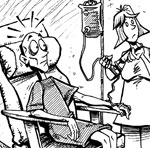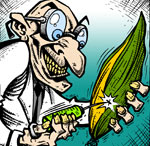Pyridoxine Deficiency - You May Be Getting Enough B6 Not to Be Sick, But Not Enough B6 to Be Well
| Share on Facebook | Share on Twitter | Share on Google+ |
Pyridoxine is the best-known form of vitamin B6, which the body uses to make the activated form of the vitamin pyridoxal 5-phosphate. Pyridoxine is the form of vitamin B6 found in plant foods, especially in whole grains, and it's the form of B6 that lasts longest in storage. The germ of seed grains is especially rich in pyridoxine.
It's a really rare event for anyone to have a B6 deficiency that causes a pyridoxine deficiency disease, but it's not rare for people to benefit from taking additional B6.
What the recommended daily intake of vitamin B6 does for you. The recommended daily intake of vitamin B6 was computed back in the 1940's, when nutritional scientists sought to use this newly discovered vitamin to prevent deficiency diseases.
If you don't get enough B6, your body can't make steroids. If you don't have natural steroids, you get pyridoxine deficiency symptoms such as chapped lips, swollen eyelids. Over time, you can suffer personality changes and even develop pyridoxine deficiency seizures.
It doesn't take a lot of pyridoxine to prevent these symptoms. A pyridoxine dose of just 0.1 milligram a day for infants up to 2.0 milligrams a day for nursing mothers will prevent classical vitamin B6 deficiency diseases. However, some people benefit from taking more than the minimum.
Who needs supplemental vitamin B6? If you eat the equivalent of a Thanksgiving or Christmas dinner every day, and a large number of people in the US, UK, Canada, Australia, and New Zealand do, then you definitely need supplemental vitamin B6.
People who eat large amounts of protein foods tend to get lots of the amino acid tryptophan. The brain uses trytophan to make the antidepressant chemical serotonin.
Ironically, too much tryptophan in the body can cause a buildup of the tryptophan byproduct kyurenine. As the brain makes more and more serotonin, kyurenine keeps the brain from absorbing trytophan to make the serotonin hormone that fights depression.
Getting more vitamin B6 won't cause the brain to absorb too much trytophan and make too much serotonin, but it will prevent the "blahs" that come along with a high-meat diet. The change in your mood can empower you to make the diet resolutions that will help you feel better for good.
Medications that deplete vitamin B6. People who take certain medications also need supplemental pyridoxine, up to 20 milligrams a day. Penicillamine, which is used to treat autoimmune conditions such as rheumatoid arthritis and scleroderma, can cause pyridoxine deficiency. So can Isoniazid, the niacin preparation for high cholesterol.
How much pyridoxine is too much? The few cases of pyridoxine overdose have occurred when more than 1,000 milligrams a day was taken for more than a month. Most regulatory agencies look for a 10-fold margin of safety. Accordingly, the United States sets the upper tolerable limit at 100 milligrams a day, and Australia and New Zealand set it at 50 milligrams a day. The UK and most of the countries in the European Union, however, limit pyridoxine supplementation to 10 milligrams per day.
Even this relatively low dose of B6 will help support recovery from a great number of health conditions. Most nutrition experts recommend 20 milligrams a day. Whatever dosage of B6 you choose, however, don't forget its co-factors, B12 and folic acid. The more meat you eat, the more B vitamins you need to keep all your B's in balance.You need complete B vitamins to get the best results.
-
Skin CareMen Skin Care
-
Free ResourcesFree eBooks
-
The natural healing force within each one of us is the greatest force in getting well.Hippocrates
-
Featured Health SupplementTotal Balance
 contains approximately one thousand, two hundred and seventy five times LESS lead than 1 tablet of the Vitamin Shoppe product.
contains approximately one thousand, two hundred and seventy five times LESS lead than 1 tablet of the Vitamin Shoppe product.
-



















